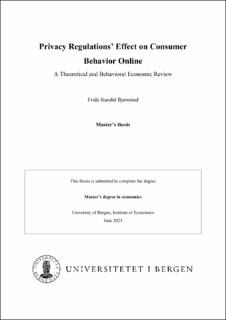Privacy Regulations' Effect on Consumer Behavior Online: A Theoretical and Behavioral Economic Review
Master thesis
Permanent lenke
https://hdl.handle.net/11250/3070614Utgivelsesdato
2023-06-02Metadata
Vis full innførselSamlinger
- Master theses [118]
Sammendrag
In May 2018 the General Data Protection Regulation came into effect. A regulation based on transparency, consent, and limits of service. The regulation gives consumers more ownership of their own personal data and companies are required to protect the data they collect, in addition to informing their consumers of why and how they use the data. In this thesis, I investigate how these privacy regulations, mainly the General Data Protection Regulation has affected consumer behavior online. Through a literature review of empirical, theoretical and behavioral papers I find that there is some effect of the regulation but there are also behavioral aspects such as nudging and biases that affect the users’ privacy choices. The thesis also looks at a model of rationality and presents a numeric example of how optimism bias, present bias and status quo bias may affect consumers' choices when presented with cookie banners. The privacy paradox also plays a part throughout the thesis to explain where the main problem lies. The thesis concludes that privacy regulations do not affect consumer behavior severely and discusses if biases and nudging can be a reason for the unchanged behavior. However, even though the General Data Protection Regulation is a step in the right direction, as it targets companies to protect consumers, the authorities need to examine possible measures on how to further protect consumers interests. Especially, regarding nudging and the privacy paradox.
